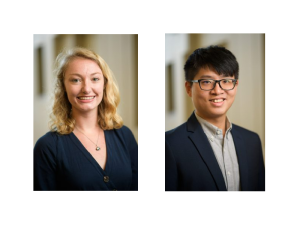Presented By: Department of Psychology
Developmental Psychology Brown Bag
Ella Simmons and Chi-Lin Yu, Developmental Psychology Graduate Students

Simmons: Examining the effect of exceptions in generic language
Generic statements (e.g., “Sharks attack humans”) provide generalizations about kinds and may be accepted even in the face of exceptions (e.g., most sharks don’t attack humans). These statements are also common in child-directed speech. Although past research has focused on the positive evidence that justifies a generic, little work has explored the role of counterevidence—that is, category members that are exceptions. Our recent work aims to understand (1) how different types of counterexamples may differentially influence whether generic statements are accepted, and (2) whether listeners have expectations about counterexamples, when presented with generic statements. In this talk I will present novel findings that adults and children were significantly less likely to endorse generic statements when counterexamples displayed an alternative property than when they displayed an absence of the property. These findings suggest that, for children as well as adults, harmful generalizations expressed with generics may be best counteracted by counterexamples that display an alternative property instead of the mere absence of the target property.
Yu: Where Do Differences in Theory of Mind Development Come from? An Agent-Based Model of Social Interaction and Theory-of-Mind
Theory of Mind (ToM), the ability to understand others’ internal states, emerges early in life and develops in childhood. Although all humans develop ToM, they do so at different paces: some develop faster and some slower. Where do these differences come from? Social interaction is surely one potent cause. In this presentation, I will use a computational agent-based model (ABM) to demonstrate how social interaction can causally influence ToM development. I will show that the amount of social interaction strongly influences the pace of a group of children to fully develop their individual ToMs and illustrate how the result holds across different group sizes and regardless of whether a child begins with an existing social network or not. Finally, I will discuss the new insights offered by a computational modeling perspective – it not only helps inform us how the differences in ToM development emerge but also helps specify an underlying mechanism for such developments.
Generic statements (e.g., “Sharks attack humans”) provide generalizations about kinds and may be accepted even in the face of exceptions (e.g., most sharks don’t attack humans). These statements are also common in child-directed speech. Although past research has focused on the positive evidence that justifies a generic, little work has explored the role of counterevidence—that is, category members that are exceptions. Our recent work aims to understand (1) how different types of counterexamples may differentially influence whether generic statements are accepted, and (2) whether listeners have expectations about counterexamples, when presented with generic statements. In this talk I will present novel findings that adults and children were significantly less likely to endorse generic statements when counterexamples displayed an alternative property than when they displayed an absence of the property. These findings suggest that, for children as well as adults, harmful generalizations expressed with generics may be best counteracted by counterexamples that display an alternative property instead of the mere absence of the target property.
Yu: Where Do Differences in Theory of Mind Development Come from? An Agent-Based Model of Social Interaction and Theory-of-Mind
Theory of Mind (ToM), the ability to understand others’ internal states, emerges early in life and develops in childhood. Although all humans develop ToM, they do so at different paces: some develop faster and some slower. Where do these differences come from? Social interaction is surely one potent cause. In this presentation, I will use a computational agent-based model (ABM) to demonstrate how social interaction can causally influence ToM development. I will show that the amount of social interaction strongly influences the pace of a group of children to fully develop their individual ToMs and illustrate how the result holds across different group sizes and regardless of whether a child begins with an existing social network or not. Finally, I will discuss the new insights offered by a computational modeling perspective – it not only helps inform us how the differences in ToM development emerge but also helps specify an underlying mechanism for such developments.